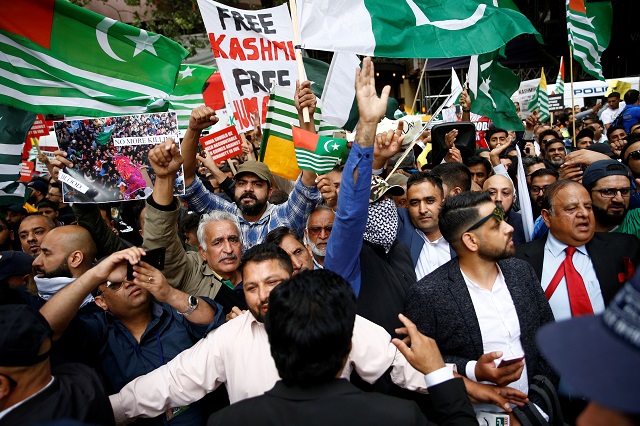
So what the world faces today are two competing interests: the interest of the people who want to secede and the broad interest of the international system to safeguard and protect the fundamental principle of state sovereignty. The big question here is what can the world do to strike a balance between these conflicting interests?
In the case of Kashmir, the abrogation of Article 370 by the Indian state clearly demonstrates the gap that exists between those that want to secede and those that want to preserve and safeguard the state sovereignty. On the one hand, during his Independence Day speech, PM Modi said, “One nation, one constitution has become a reality post-Article 370 abrogation.” On the other hand there is now a great realisation on the part of the Kashmiri people that continued reliance on the principle that “good behaviour will lead to success” may no longer be workable. Obviously, as of now there are no voices coming out of Kashmir to make such an assessment, but hearing young Shah Faesal, the leader of Jammu and Kashmir People’s Movement, respond to some very tough questions during the recent BBC programme “Hard Talk”, one can easily assume how the Kashmiris are now likely to channel their anger. Faesal clearly said that under the current conditions imposed by India the choice with the Kashmiris is clear: “either you could be a separatist or a stooge”. When asked by Stephen Sackur, the programme host, to explain what he like to be would, Faesal responded, “I would not like to be a stooge.” Faesal, who was arrested by the Indian authorities after the show, was very explicit in making an important observation. He said, “All those people who believed that some kind of resolution to this dispute was available within the framework of the Indian constitution have been slapped on 5th August.”
Regardless of what the UN may decide at its headquarters in New York, it is my belief that the people in India-held Kashmir (as soon as the curfew conditions are relaxed) will now come out with a greater resolve for independence, creating a showdown with the Indian occupation forces who already being trigger-happy would resort to gunning down unarmed people. That is the kind of eventuality that the world leadership should pre-empt and prevent.
It is said that to understand the world of tomorrow we must look back at the world of yesterday. Apart from many other people in yesterday’s world, the Iranian people suffered for a quarter of a century under the repressive and autocratic rule of Reza Shah Pahlavi imposed on them by the United States in August 1953. It was ultimately the massacre of Black Friday that convinced the Iranians that the repressive Shah would go to any lengths to “maintain his absolutist power”. It was the sacrifice given on that day that laid the foundation of success of the Iranian Revolution. On Black Friday, 8th September 1978, tank-mounted soldiers gunned down a large Iranian crowd that had gathered in the Jaleh Square in Eastern Tehran. By the time the square was cleared, some 1,600 people lay dead (more than 2,300 died due to their injuries during the next few days). Yesterday’s world and its decisions have been unable to prevent massacres like that of Black Friday. The hope is that the new world can make different decisions and prevent such massacres from taking place because it believes in preserving and advancing freedom, human rights and the value of the rule of law. Is India part of the new world? If it doesn’t believe in these values, can it still be called a secular state and the biggest democracy in the world?
To every action, there is a consequent reaction. If your resolve doesn’t falter, if you have the faith to hold on to your nerves as a people, movement or a state, you can remain focused on your end goal and political aim and achieve it as well. Qatar’s resolve was put to test by Saudi Arabia for maintaining normal ties with Iran, as the Kingdom forced the UAE, Bahrain and Egypt to cut off their commercial and diplomatic ties with Doha. This move drove Qatar towards other options and into the “welcoming arms of Iran” and “military and economic cooperation with Turkey”. Resultantly, Qatar’s short-term political aim of holding the 2022 FIFA World Cup remains on track as Turkish construction companies play a huge role in building the stadiums in the country. Qatar has specialist builders and engineers to help and sustain its short-term goal, but it is not this but another kind of engineering that Kashmir needs to finally breathe a sigh of relief.
Michael McFaul, the US ambassador to Russia (2012-2014) and author of the book From Cold War to Hot Peace makes an interesting point. He writes, “In diplomacy Americans often act as engineers, when they see a problem, they want to fix it.” In Pakistan, people remember the mediation and arbitration offer on Kashmir that President Trump made to our visiting Prime Minister. Kashmir hasn’t had the attention of “American engineering” — but its time it did.
Published in The Express Tribune, August 18th, 2019.
Like Opinion & Editorial on Facebook, follow @ETOpEd on Twitter to receive all updates on all our daily pieces.


1729662874-0/One-Direction-(1)1729662874-0-165x106.webp)








COMMENTS
Comments are moderated and generally will be posted if they are on-topic and not abusive.
For more information, please see our Comments FAQ